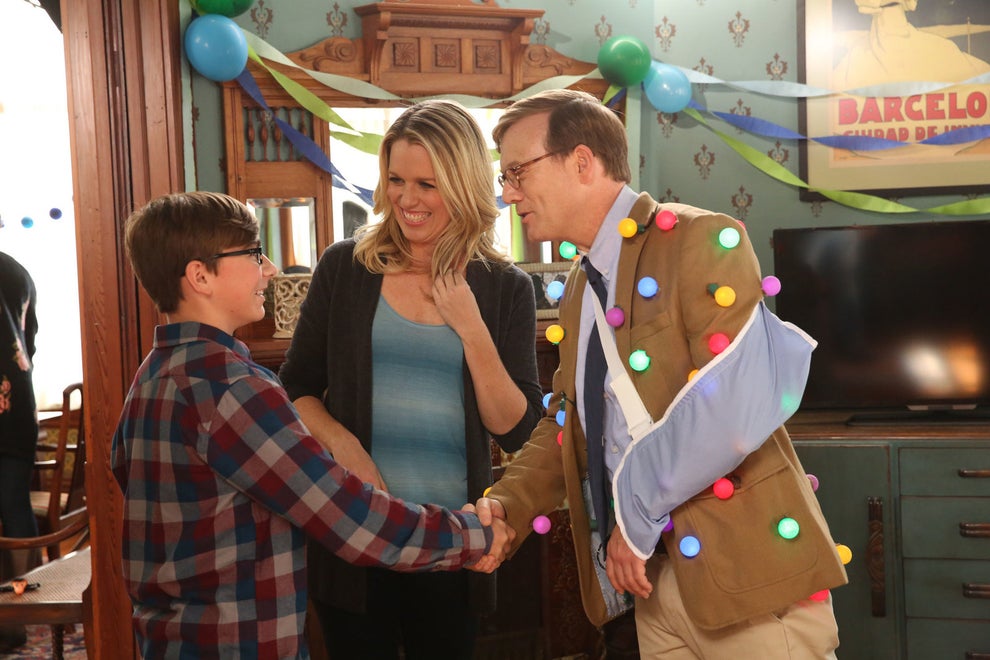
If criticism had a patron saint, it would be Forrest MacNeil, the host-as-tragic-hero of Comedy Central’s Review, which came to a close on Thursday on precisely the kind of despairingly chipper note the series has refined over 22 brilliantly excruciating episodes.
Review, which was co-created by its wonderful star Andy Daly, was a scripted series in the form of a reality show. Every episode, Forrest reviewed various life experiences based on requests submitted by a fictional audience. The assignments ranged from the seemingly benign (“having a best friend”) to the exceedingly dangerous (“being buried alive”), though even the most harmless of ideas tended to go horrendously wrong.
In an early episode that’s a series high-water mark, Forrest reviews the act of eating 15 pancakes (half a star) and eating 30 pancakes (five stars), the bouts of binge-eating and vomiting bookending a brutal sequence in which — in the name of his show — he ends his marriage to his adored wife Suzanne (Jessica St. Clair) in order to assess getting a divorce.
Forrest’s work cost him a lot, including his spouse, his child, his home, and his father. He himself endured getting shot, stabbed, hit by lightning, and lost at sea. Over Review’s two and a half seasons, Forrest started to feel like a human Wile E. Coyote in a tan blazer, enduring endless, over-the-top punishment in a pursuit he couldn’t seem to quit. Or maybe he was in hell, with his producer Grant (James Urbaniak, throwing sly looks to the camera) the demon prodding him into acts of self-torture for the sake of the show.
Kaden Gibson as Eric, Jessica St. Clair as Suzanne, and Andy Daly as Forrest MacNeil. Michael Yarish / Comedy Central
Critics have, unsurprisingly, always taken it on the chin when they’re put onscreen, portrayed as ethically compromised opportunists, joyless snobs, and/or self-important guardians of art in works like Ratatouille, The Critic, All About Eve, and Birdman. They are generally shown to be unloved and unlovable — but who could help but adore Forrest? Pompous, clueless, hopelessly square, he was convinced he was doing a public service when everyone actually seemed to see him as some dancing puppet. Forrest was an epic fool, but he was a noble one, pledged to the ethics and self-determined regulations of his craft even as the world burned down around him.
Forrest’s problem was a grandiose, hilariously dark version of the one all critics face: To review something is to operate under the pretense that your particular experience is universal, that it can stand in for everyone’s, and that the personal and the professional can be separated out. He was particularly deluded about everybody else’s willingness to accept the cleanness of that divide, vandalizing his relationships again and again, then reacting with bewilderment when, say, the woman he was dating became angry that he was blackmailing her for the show (blackmail: one and a half stars).
Forrest was attached to the idea that he could review something objectively even as Review revealed the relentless subjectivity of his every ordeal. He approached reviews out of spite (sleeping with a celebrity) or loneliness (marrying a stranger); he was oblivious to context (glory holes) and self-delusional (having the perfect body). He attempted to intellectualize rather than emotionalize whole swaths of his existence. He suffered for our sins — for, more than anything, that strange and terribly specific sin every critic commits in consuming something they would’ve never bothered with were it not for work. For work, we watch or read or eat or try things we never would otherwise — as a service to others, an attitude it’s squirmingly uncomfortable to see represented and skewered so smartly onscreen.
You can’t just separate out an experience from everything that defines you and consider it dispassionately. But Forrest, bless him, tried, as declared in his perfectly overstated tagline: “Life — it’s literally all we have. But is it any good?” We may never know, but at least we can be assured that Forrest lives on, waiting for a next assignment that will never come, long after his show has gone away.


